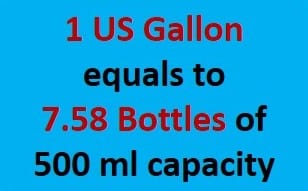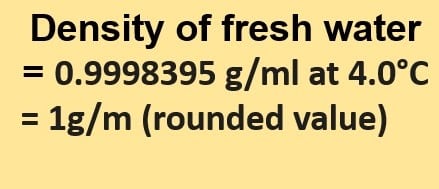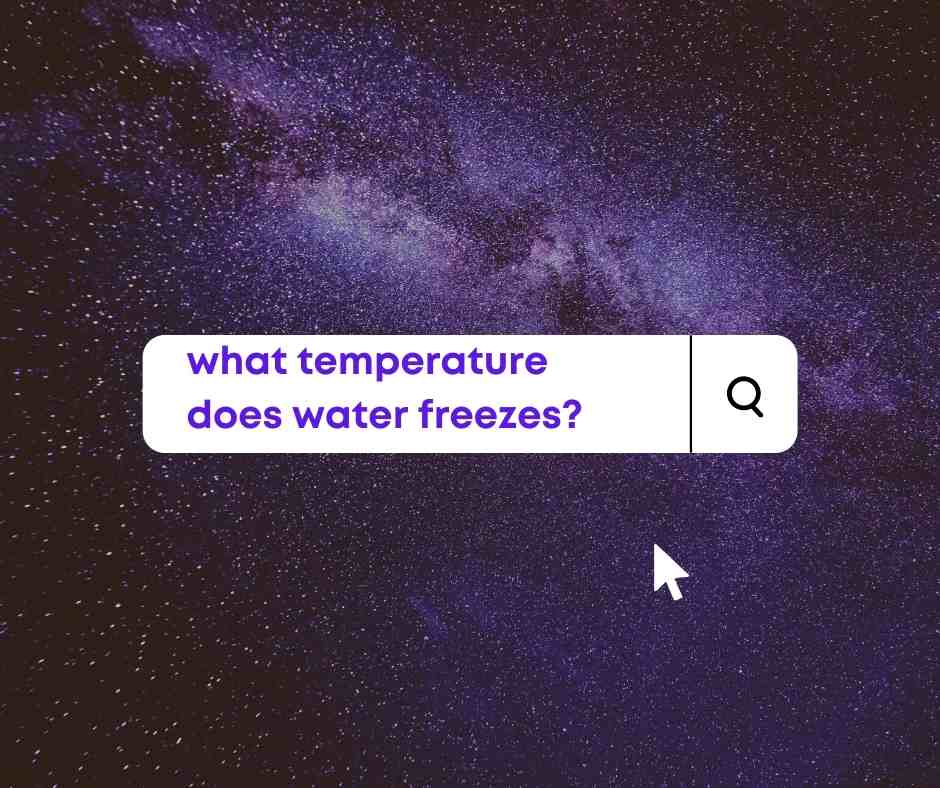The unit weight, also known as the specific weight, is the weight per unit volume of a material.
The unit weight of water is 1 gram per centimeter at 25 degrees Celsius in the metric system and 62.4 pounds per cubic foot at 77 degrees Fahrenheit in the imperial system.

| Unit weight of water (weight/volume) | 1 g/cm3 at 25 degrees Celsius |
| 1 liter of water | 1000 grams, 35.274 ounces, or 0.264 US gallons |
| 1 US gallon of water | 8.345 pounds or 3.785 kg at 17 °C |
| The specific gravity of water | The specific gravity of water is 1 at 4 degrees Celsius. Specific gravity is a ratio and has no units. |
| Cubic Foot of Water Weight | 62.48 pounds at room temperature. 7.5 gallons of water. |
When it comes to cooking, water weight is crucial. Many recipes use weighted ingredients rather than fixed amounts such as tablespoons or cups. So, if you don’t have a food scale, knowing how much certain amounts of water weigh can help you ace any meal.
To determine the weight of water, first, determine its density (1 kg/L at 39.2°) and volume. To find the weight, first, convert the volume of water to liters and then multiply by the density.
When measured at its maximum density, which occurs at about 4 degrees Celsius, one liter of water has a mass of almost exactly one kilogram. As a result, one-thousandth of a liter of water, also known as one milliliter (1 mL), has a mass of about 1 g; 1000 liters of water has a mass of about 1000 kg (1 tonne or megagram).
According to the National Institute of Standards and Technology, a cup of water weighs approximately 224 grams (half a pound).
According to the United States Geological Survey, a liter of water weighs about 1 kilogram (2.2 pounds) (USGS).
According to the USGS, a gallon of water weighs approximately 3.79 kilograms (8.35 pounds).
Table of Contents
Unit Weight for Some common Materials
| Material | Imperial Units (lb/ft3) | SI Units (kN/m3) |
| Aluminum | 172 | 27 |
| Gasoline | 42.5 | 6.67 |
| Glycerin | 78.6 | 12.4 |
| Mercury | 847 | 133.7 |
| Seawater | 63.9 | 10.03 |
| Stainless Steel | 499 – 512 | 78 – 80 |
| Water | 62.4 | 9.81 |
Weight Of Water
The weight of water depends upon the temperature at which it is stored.
For the purposes of answering the question, “How much does a gallon of water weigh?” we will focus on the weight of fresh water at 62 degrees Fahrenheit (17 degrees Celsius).
1 US gallon of water equals 8.345 pounds, which is 3.785 kg (at 17 °C).
1 imperial gallon of water = 10.02 pounds, or 4.545 kg (at 17 °C).
The weight of 1 liter (l) of pure water (at 4 °C) is equal to 1 kilogram (kg).
The Density Of Water
At 4.0°C (39.2°F), the density of water in g/ml is 0.9998395. This is the same as 1 gram per milliliter (g/ml) or 1 gram per cubic centimeter (g/cm3), rounded up.
The grams per milliliter (1 g/ml), grams per cubic centimeter ( g/cm3), and pounds per cubic foot ( lb/ft3) are common water quantities. At 4°C, the density of fresh water on Earth is typically assumed to be 1000 kg/m3.
Density is the amount of matter in a certain volume. It is the mass-to-volume ratio of a substance. If we use the same amount of wood and iron, We’ll discover that iron is significantly heavier than wood. This is because iron has a greater density than wood.
Density vs. Specific Weight and Specific Gravity
| Density | Specific gravity | Specific Weight |
| Density (ρ) is defined as mass per unit volume. Mass is a property and the SI unit for density is [kg/m3]. | Specific gravity (SG) is defined as the ratio of the density of a substance to the density of water – at a specified temperature | Specific Weight is defined as weight per unit volume. Weight is a force. |
| ρ = m / V ρ = density [kg/m3], [slugs/ft3] m = mass [kg], [slugs] V = volume [m3], [ft3] | SG = ρsubstance / ρH2O SG = Specific Gravity of the substance ρsubstance = density of the fluid or substance [kg/m3] ρH2O = density of water – normally at temperature 4 oC [kg/m3] | γ = ρ ag where γ = specific weight (N/m3], [lb/ft3] ρ = density [kg/m3], [slugs/ft3] ag = acceleration of gravity (9.807 [m/s2], 32.174 [ft/s2] under normal conditions) |
| The SI unit for density is [kg/m3]. The Imperial (U.S.) units for density are slugs/ft3 but pound-mass per cubic foot – lbm/ft3 – is often used. | SG is a dimensionless quantity | The SI unit for specific weight is [N/m3] |
How Many Bottles Of Water Equal A Gallon?
A gallon (gal) is 231 cubic inches, which is equal to 3.785 liters or 7.58 bottles of water in the United States. One gallon is equal to 4.55 liters and 9.1 bottles in the Imperial system used in the United Kingdom. A gallon contains 128 fluid ounces, while a half-gallon has 64 fluid ounces.
Please refer to the full article “How many bottles of water equal a gallon” for in-depth analysis.
Related Topics
Water Cycle
Why Does Oil Float on Water?
Dynamic Viscosity-An Overview
Thermal Conductivity of Water
Soft Water vs. Hard Water
Frequently Asked Questions
Some of the frequently asked questions are given below
1. At what temperature does water freeze?
Water’s normal freezing and melting points are 0 degrees Celsius or 32 degrees Fahrenheit.
2. What is the specific heat of water?
The specific heat formula is the amount of heat supplied to the specimen, divided by the resulting temperature increase. CP is related to the unit mass of the specimen. The mathematical form of the formula is Q/m ΔT=cp where Q refers to the amount of heat supplied to the specimen and ΔT is the rise in temperature. Please refer to the full article, “The Specific Heat of the Water.”
3. What is the weight of water in kg?
At 25°C (77°F or 298.15K), the weight of water is 1 gram per cubic centimeter or 1,000 kilograms per cubic meter. This means that the density of water is 1000 kg/m3. Weight per cubic foot: 62.4 pounds per cubic foot [lb/ft3], or 0.58 ounces per cubic inch [oz/inch3].
4. What is weathering?
Weathering is the process by which rocks on the Earth’s surface break down or dissolve. Weathering is a natural process that breaks down and removes material from the coast. Exposure to the elements causes surfaces to deteriorate over time.
5. What is the density of water in lbft3?
Density is a physical property that expresses the mass per unit volume. In the case of liquid water, the density of water is close to 1000 kg/m3, though it varies slightly depending on temperature.
The density of water lb/ft3 is 62.428 lb/ft3.
6. Is boiling water a chemical change?
At one atmosphere of pressure, the boiling point of water is 100 °C or 212 °F (sea level). The value, however, is not constant. The boiling point of water is affected by atmospheric pressure, which varies with elevation.
7. Is burning wood a chemical change?
Burning wood is a chemical change in which wood is converted into carbon dioxide, water vapors, and ash in the presence of heat and oxygen.
8. Is water a mixture?
Water is not a mixture. It is a pure hydrogen-oxygen compound. Put, hydrogen, and oxygen react chemically to form a compound called water. Check the full article “is water a mixture?”.
9. What is the melting point of water?
The melting point of pure water ice at 1 atmosphere of pressure is very close to 0 °C, which is 32 °F or 273.15 K.
More Links
Mass vs Weight| 5 Easy Examples
Gravitational Potential Energy (w=mgh)
Relativistic Kinetic Energy| Easy Explanation
The Otto Cycle| A Simple Overview
Physical and Chemical Properties of Water
Kinematic Viscosity of Water
- BCl3 Lewis Structure in four simple steps - November 1, 2023
- PH3 Lewis Structure in four simple steps - October 8, 2023
- PF3 Lewis structure in four simple steps - September 24, 2023



